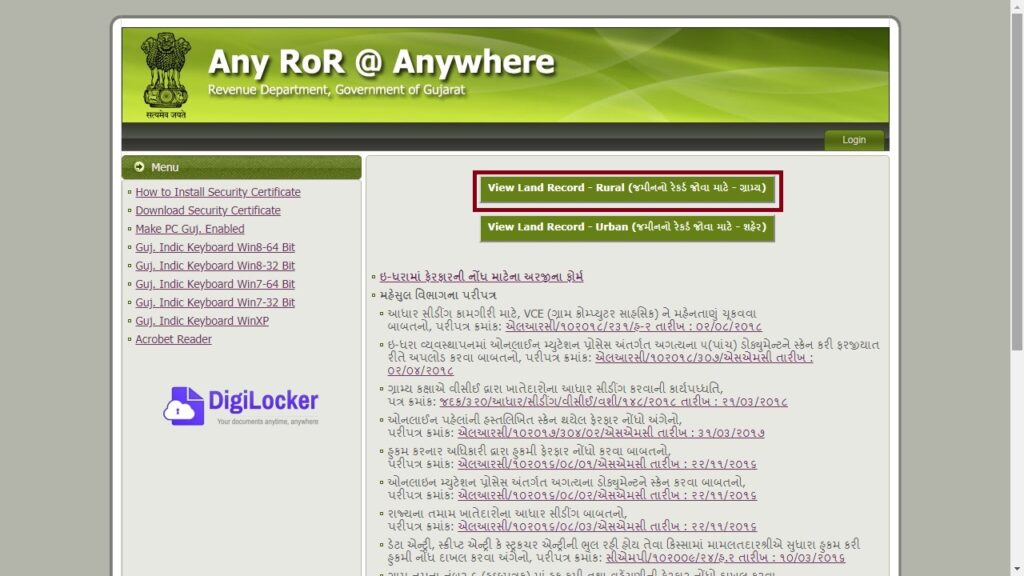Gujarat Records of Rights – Khatian
The Government of Gujarat, the AnyROR E-Dhara portal aims to provide easy access to registered land records, including 7/12, 8A, and 8/12 extracts. Users in both rural and urban areas of the State can access the portal for crucial land-related documents, evading the hassle of visiting offices. Gujarat Record of Rights (ROR) is an extract from the land records registers held by the Revenue Department of State Government. ROR contains complete information regarding the land or property and history of holders of land. This revenue document is a vital indicator of the legal status of a land/property. The Gujarat Record of Rights (Khatian) register is maintained in the concerned Revenue Department for every village separately. The government of Gujarat issues certified copies of entries in the record of rights (land records) to residents of Gujarat. Uses of Gujarat Records of Rights In Gujarat, ROR is used to check the ownership of an ancestral land or any other land. Extracts of ROR or land record can be used to obtain details of land type, and the of activities carried out on land. Gujarat ROR is a vital document to obtain information regarding an agricultural aspect of the land and its surrounding areas ROR or Khatian is required at Registrar’s office when sale transaction of land (mutation) is being done. Gujarat record of rights is one of the mandatory documents to raise farm creditor to get a bank loan The court requires land record proofs in case of any civil litigation. Certified copy of ROR can be produced for this purpose. It is mandatory to check the land record of the seller and ensure his/her ownership of the area while buying property Buyer has to verify the revenue records of the land (ROR) on which the flat is being constructed in case of buying flats. Importance of Gujarat Records of Rights Gujarat Records of Rights (Khatian) endorses the real owner of a land This land record – Khatian is beneficial to find the false claim on the lands Usage of the certified copy of records of rights or extract of ROR avoids land grabbing Gujarat record of rights can be used in court litigations related to property Attributes in Gujarat Records of Rights Details of changes in ownership Nature and limits of owner’s rights and conditions Mutation numbers Details of the loan taken by the land occupant/owner Type of irrigation (irrigated kind land or Rainfed nature) Details about the type of crops planted in the last cultivating season Type of soil (agricultural or non-agricultural) Survey number of the land/Property Area of the earth – Fit for cultivation Details pending loans for buying seed, pesticide or fertilizers Details of charge of attachment and decrees under the order of the civil court or revenue authority Aspects of pending litigations The field in possession of each landowner and the classification of each area are entered from the Dag Chitha Aspects of property tax paid and unpaid Eligibility Criteria The certified copy of Gujarat records of rights (ROR) will be provided only if there is no dispute regarding the land ownership and the concerned land should not Gujarat Government land or assigned land belonging to the State Government. Applicable Fee For obtaining the certified copy of Gujarat records of rights, the applicant needs to pay a fee of Rs.20. Prescribed Authority Revenue Department, Government of Gujarat, is the concerned department for the issuance of certified copy of Gujarat Records of Rights. The applicant requesting for the ROR should apply to the Tahsildar of the concerned Tahasil which is the competent authority. Check Gujarat Khatian Online Step 1: You have to access the Home page of the Any ROR at Anywhere website. Step 2: Select the View land record option from the home page. The link will redirect to new page. Step 3: In the new page, you have to VF8A Khata Details and select concerned District, Taluka from the drop-down menu. FAQs What is Gujarat Record of Rights (RoR) – Khatian? The Gujarat Record of Rights (RoR) – Khatian, also known as ‘7/12’ or ‘Satbara Utara’, is a crucial land document in Gujarat that provides details about land ownership, land rights, and land use. It is maintained by the Revenue Department of the Government of Gujarat. How frequently should the Gujarat RoR – Khatian be updated? The Gujarat RoR – Khatian should ideally be updated whenever there is a change in ownership, use, or any significant event affecting land rights. It is essential to maintain accurate and updated records for legal clarity and property transactions.
Gujarat Records of Rights – Khatian Read More »



